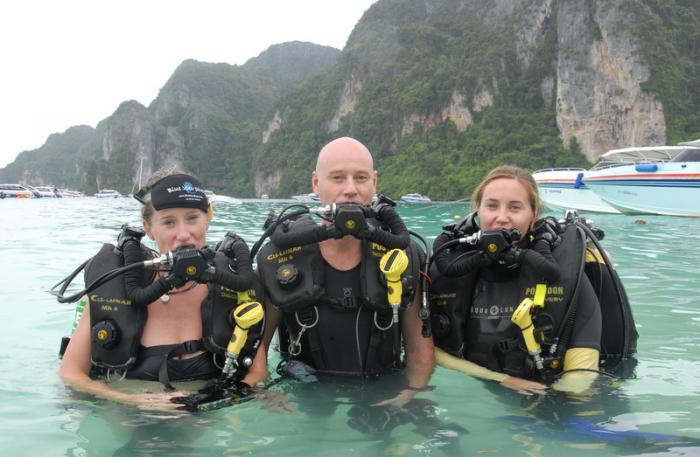Diving: Becoming a super dive master

PHUKET: If you’re going to be a super Dive Master (DM), going from zero to hero isn’t the ticket – at best you’ll end up as Aqualad, making his debut in the 60s as the sidekick of the already lame Aquaman.
However, that doesn’t stop the trend of people going from non-divers to professionals in a couple of months in Phuket or worldwide. That’s not to say that DMs with 60 dives, the minimum PADI requirement, won’t eventually log the necessary experience to become extraordinary, but it does mean that the quality of any given DM is as varied as the marine world they’ll be taking clients to explore.
It comes down to the diving bug. Some people inhale it on their very first breath underwater. From that moment forward – at least for the next couple of months or so – it’s eating, sleeping and diving: total submersion.
On the other side of the spectrum, there are a few of us – very few of us – who have slogged up the ladder from the bottom rung to the professional side of the industry over a decade.
It’s the proverbial tortoise versus hare, where the real winner is some amiable creature in between.
I walked the path of the tortoise, and though I don’t think there is a rush for divers to collect certification cards up to their DM as fervently as Pokemon, I wouldn’t recommend the route I swam.
The PADI Dive Master course was revamped in 2010, going from eight written tests to a single final written test. In 2005, I passed all but one of those eight tests before having a fallout with my instructor and giving up on the course – one test and twenty dives shy of completing it.
What most people finish in several weeks has now taken me an entire decade to complete. I am perhaps one of the few people in the world that has had the unfortunate opportunity to take both the old and the new PADI DM tests. Again, not something I would recommend.
The advantages of a drawn out DM course – the course I started anew and eventually wrapped up in Phuket last year – is that you work with a number of instructors, each of whom has a slightly different passion within the industry and a unique set of tricks for getting things done. Some can rattle off the Latin name of every flamboyant, beautiful nudibranch; others are gear heads and still others are teachers at heart.
Having the opportunity to work with a variety of instructors creates a more well-rounded DM. However, long periods of not diving or simply not functioning as a DM in training leads to sloppy skills: your demonstration on how to clear a mask that was crisp and clear when you started the course can get messy over the months.
Because the DM certification is the introduction to the professional world of diving, it’s important to understand why you’re taking the course. If you’re diving into the course for the certification card and to advance your understanding of diving, which was my motivation, you need to ask yourself whether or not it’s the right course for you. Would you be better off learning about sidemount diving or any of the other recent specialty courses offered by PADI, or just getting wet and enjoying the beauty of the underwater world?
Perhaps the most exciting and important role a DM plays in the professional community is leading guided tours for certified divers, showing them the secrets of each dive site: which sea fans on Koh Doc Mai have the Tiger-tail seahorse, which rocks to look under for juvenile Bamboo sharks and so on.
To do this well, there needs to be a balance between the kind of experience that only comes with time and the habits that can be maintained when you start to forget what your hair feels like without Andaman’s salt in it.
The reality is that the some of the best trained DMs go through an internship or apprenticeship program. It throws them into the deep end of the industry, usually providing as many dives as they can safely manage in a week and building up their wealth of real-world experiences, from assisting instructors who can show them how to manage a wide-eyed, panicking Discover Scuba Diver, to the trick to spotting a Crinoid Shrimp.
— Isaac Stone Simonelli
Join the conversation and have your say on Thailand news published on The Thaiger.
Thaiger Talk is our new Thaiger Community where you can join the discussion on everything happening in Thailand right now.
Please note that articles are not posted to the forum instantly and can take up to 20 min before being visible. Click for more information and the Thaiger Talk Guidelines.
Leave a Reply
You must be logged in to post a comment.









